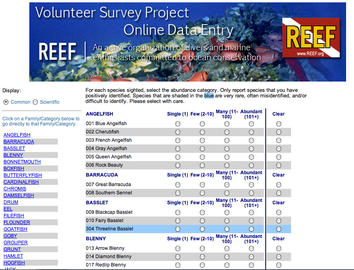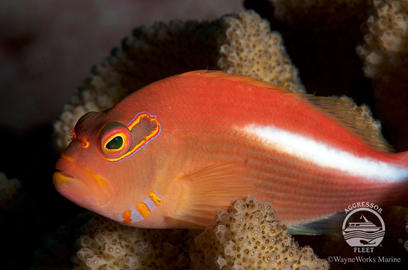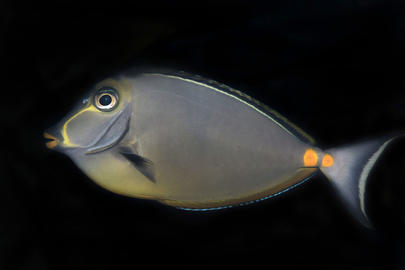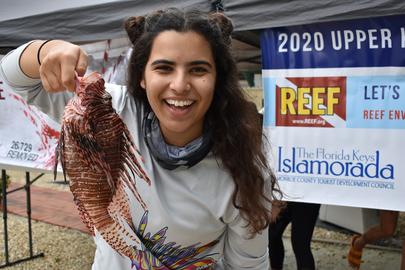From walls adorned with spectacular corals, wrecks that are home to a diverse array of marine life, or shallow reefs teeming with tropical fish species, the dive sites of Grand Cayman will delight REEF surveyors, who will enjoy fish id seminars each day. Weather permitting, trips to Stingray City and the USS Kittiwake will be scheduled for the group, and participants may also take advantage of the unlimited shore diving directly in front of Sunset House. |
Current search
Search found 303 items
- tropical western atlantic
Dear Valued REEF Members,
Contact:
Christine Ward‐Paige; Halifax, NS; globalshark@gmail.com, www.eShark.org
Boris Worm; Dalhousie University, Halifax, NS; bworm@dal.ca; (902) 494‐2478
What is the VFSP? | How do I access the database and summary reports? | How do I participate? | The Roving Diver Survey Method | Can I collect data while snorkeling or freediving? | Submitting your data | Can I still use Scantron forms? | When and where are surveys conducted? | How has the Volunteer Fish Survey Project expanded around the world? |
We are excited to announce the launch of Online Data Entry 2.0. The new version includes several upgrades and now encompasses all of REEF's project regions. At long last, our REEF surveyors in the Tropical Eastern Pacific region (Baja Mexico - Galapagos Islands) and the Northeast US & Canada (Virginia - Newfoundland) are able to submit their survey data online. In addition, based on feedback from our members, the interface to add unlisted species has been greatly improved.
Aloha! From wrasses to butterflyfish, discover the many endemic marine species of Hawaii while diving the volcanic underwater reef topography around the Big Island, including favorite sites such as Au Au Crater, Amphitheater, and Turtle Pinnacle. A fantastic backdrop of lava flows will provide a picturesque landscape for surface intervals aboard the comfortable Kona Aggressor II liveaboard.
REEF Trips Program and Communications Manager
In April 2018, two non-native marine fish species were live-captured from South Florida waters, including an Orangespine Unicornfish (Naso lituratus) in Key Largo and a Lagoon Triggerfish (Rhinecanthus aculeatus) in Fort Lauderdale. Both fishes, native to a wide range in the tropical west Pacific, were collected separately through a collaborative effort between REEF, Phillip and Patricia Frost Museum of Science, and the United States Geological Survey (USGS).
KEY LARGO, FLA. – In spite of Tropical Storm Sally’s unexpected appearance over south Florida, 23 teams took to the water this weekend, bringing in a total of 1,321 invasive lionfish during the 2020 Upper Keys Lionfish Derby; the most fish ever harvested at a REEF Lionfish Derby held in the Florida Keys. Teams were permitted to fish anywhere in Florida, from sunrise to sunset on Friday, Sept. 11 and Saturday, Sept. 12. More than $4,000 in cash and prizes was awarded to teams who brought in the most, largest, and smallest lionfish.




